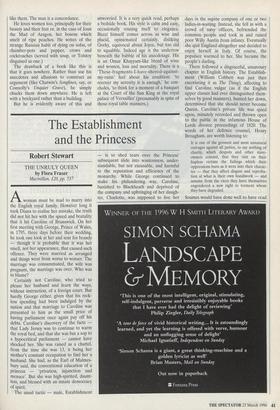The Establishment and the Princess
Robert Stewart
THE UNRULY QUEEN by Flora Fraser Macmillan, £20, pp. 537 Awoman must be mad to many into the English royal family. However long it took Diana to realise her mistake, the truth did not hit her with the speed and brutality that it hit Caroline of Brunswick. On her first meeting with George, Prince of Wales, in 1795, three days before their wedding, he took one look at her and sent for brandy — though it is probable that it was her smell, not her appearance, that caused such offence. They were married as arranged and things went from worse to worser. The marriage was consummated, the wife was pregnant, the marriage was over. Who was to blame?
Certainly not Caroline, who tried to please her husband and learn the ways, without instruction, of a foreign court. But hardly George either, given that his reck- less spending had been indulged by the nation and that marriage to Caroline was presented to him as the small price of having parliament once again pay off his debts. Caroline's discovery of the facts that Lady Jersey was to continue to warm the royal bed, and that she was but a sop to a hypocritical parliament — cannot have shocked her. She was raised as a chattel, from the time she was 13, it being her mother's constant occupation to find her a husband. She had, as the Earl of Malmes- bury said, the conventional education of a princess — 'privation, injunction and menace'. But she was high-spirited, daunt- less, and blessed with an innate democracy of spirit.
The usual tactic — male, Establishment — is to shed tears over the Princess' subsequent slide into wantonness, under- standable, but not excusable, and harmful to the reputation and efficiency of the monarchy. While George continued to make his philandering way, Caroline, banished to Blackheath and deprived of the company and upbringing of her daugh- ter, Charlotte, was supposed to live her days in the supine company of one or two ladies-in-waiting. Instead, she fell in with a crowd of navy officers, befriended the common people and took in and raised poor Willy Austin from infancy. Eventually she quit England altogether and decided to enjoy herself in Italy. Of course, the populace warmed to her. She became the people's darling.
There followed a disgraceful, unsavoury chapter in English history. The Establish- ment (William Cobbett was just then excoriating it as The Thing), affecting to find Caroline vulgar (as if the English upper classes had ever distinguished them- selves by good manners), hunted her down, determined that she should never become Queen. Caroline's private life was spied upon, minutely recorded and thrown open to the public in the infamous House of Lords divorce proceedings of 1820. The words of her defence counsel, Henry Brougham, are worth listening to: It is one of the grossest and most unnatural outrages against all justice, to say nothing of charity, which despots and other slave- owners commit, that they visit on their hapless victims the failings which their oppressions burn as it were into their charac- ter — that they affect disgust and reproba- tion at what is their own handiwork — and assume from the vices they have themselves engendered a new right to torment whom they have degraded.
Soames would have done well to have read that.
George failed to get his divorce, but the Establishment won the game. Caroline was never crowned Queen. As she made her progress from Mayfair to the Abbey for her husband's coronation in July, 1820, when for the last time the Establishment was to shut a door in her face, the London mob, that mob that a year later would spit on Castlereagh's coffin and a decade later would not shed a tear for the dead George IV, paid her little attention, though on her return to these shores from Italy a few months earlier they had cheered her to the skies. Caroline was a most ordinary woman, of ordinary generosity and ordi- nary hopes, born into married into an extraordinary station. Diana, too, is just such an ordinary woman. It is the very ordi- nariness that makes them loveable. And expendable. Though George was reviled (as, it hardly needs to be said, Charles is not), the monarchy scarcely faltered. Plus ca change?



































































 Previous page
Previous page